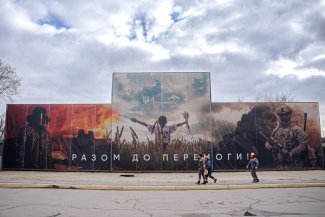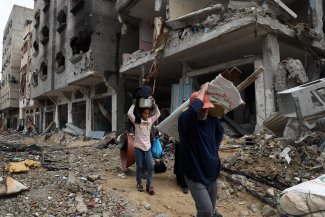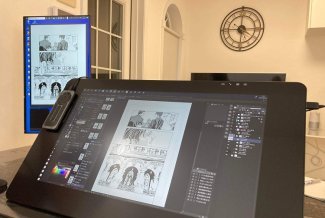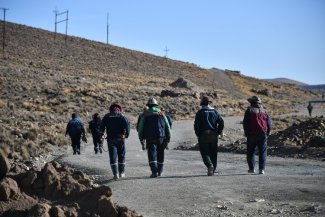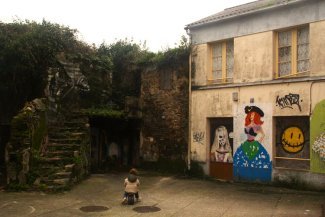From three o’clock in the morning, the same scene repeats itself, day after day, at the huge ‘border post’ of Bethlehem, also known as Checkpoint 300. A long queue of mostly men, of all ages, forms along the Israeli wall built here in the land of Bethlehem, around two kilometres from the Green Line [demarcation line traced in 1949 between Israel and the Palestinian Territories]. They come from various towns and villages in the south of the West Bank to go to work on the other side of the wall, in Israel or East Jerusalem, in Palestinian territory.
There is a small market just before the checkpoint, with stalls where the workers can buy food or drinks for the day ahead. Amir has been there every morning for the last four years, selling phone cards to help pay for his studies. “The workers arrive very early, because they work far away, in Tel Aviv. They still have to spend two hours on the bus [after having crossed the checkpoint]. At times, the crossing is quite fast, at others, it’s more difficult. People push and try to climb over the others. You can end up dead here. Imagine 2,000 people shoving and pushing : of course, there are problems ! It is really awful. I’ve seen a lot of injuries over the years. Sometimes, the [Israeli] soldiers come on this side to shout [at us],” says Amir.
The queue moves slowly forward. Everyone has to go through the turnstile, controlled by an Israeli soldier sat in a closed booth – a single turnstile for thousands of people. The soldier only lets a certain number through at a time, to avoid overcrowding at the following point of control.
The workers still have to go through a metal detector and have their work permit and fingerprints checked before being allowed to cross to the other side where vans and small buses are waiting to take them to work. The whole process can take up to two hours, or more if there is a problem.
On the way back, crossing the checkpoint is usually faster, as the Israeli soldiers do not check the permits in this direction. But after the testing crossing in the morning, the lack of sleep and the often punishing day’s toil, the workers reach home exhausted. The impact on their family life is devastating. The fathers who work see very little of their children, and when they are back, they are too tired to be fully involved in the life of the family. The daily humiliations also have harmful effects on their psychological well-being and mental health. A report by Medical Aid for Palestinians indicates that “chronic exposure to humiliating experiences has been associated with higher levels of fear, depression and stress among Palestinians in the West Bank”.
The understaffing, the lack of infrastructure and the intensification of the checks with every passing year can have devastating repercussions. According to the International Labour Organization, the crossings are “inhumane and humiliating”.

Dès trois heures du matin, les travailleurs palestiniens commencent à arriver au checkpoint de Bethléem. Celui-ci, surtout le dimanche, peut devenir bondé. Certains grimpent le long des barres de métal pour dépasser les autres dans la file d’attente.
According to the Palestinian Central Bureau of Statistics, around 121,000 Palestinians are working in Israel or Israeli settlements in 2018, that is, one out of six workers from the West Bank. Only half of them have a work permit, so that is 64,000 people who, every day, cross one of the 13 checkpoints set up by the Israeli occupation authorities, which claim the checkpoints are essential to their security. Tens of thousands of others also cross the Green Line on a daily basis without a permit, through clandestine channels. The reason for these crossings is that wages are much better in Israel than in the West Bank, where unemployment remains high, at more than 30 per cent.

EAPPI, le programme œcuménique d’accompagnement en Palestine et en Israël, qui envoie chaque année des volontaires qui documentent la situation aux checkpoints, estime que, chaque matin, 4.000 à 6.000 travailleurs passent le checkpoint entre quatre heures et six heures.
A formidable black market has developed around the permits, taking advantage of the workers’ vulnerability. Thirty-year-old Mohannad explains how he earns around €60 a day but has to pay €600 a month for the permit. “It’s the same for every job, it’s very costly,” he says. He also speaks about his fear of reaching work late : “We often arrive at ten o’clock and the manager sometimes turns us away. I’m supposed to be at work at seven o’clock in the morning. Imagine what a situation we’re in. The [Israeli] army makes us late.”

Mohammed, 88 ans, qui va vendre ses légumes tous les jours à Jérusalem, ne veut pas passer le checkpoint dans ces conditions. « Ce n’est pas une vie », dit-il.
Some cannot cope with the conditions and wait until the crowds die down. Eighty-eight-year-old Mohammed waits on the side until there is less of a crowd at the checkpoint. He goes to Jerusalem every day except Friday, to sell a few vegetables at the market. “It’s not a life,” he laments, looking with a mixture of sadness and indignation at the dense crowd, crammed between iron bars, waiting for an Israeli soldier to open the turnstile.

Seul le vendredi, jour de congé pour les musulmans, est plus tranquille. Quelques pèlerins traversent plus tard dans la matinée pour se rendre à la prière du vendredi à la grande mosquée Al-Aqsa de Jérusalem.
Only Palestinians with a permit issued by the Israeli authorities are allowed through the checkpoint. The Israeli domestic security service, Shin Bet, has to approve the issue of a magnetic card. Only workers who are married and have at least one child can obtain a permit. But to marry, young men need sufficient money to pay for a home. Many, therefore, finding themselves in a catch-22 situation, try their luck and cross into Israel through clandestine channels, despite the risk of arrest.

Quand la « ligne humanitaire », réservée aux femmes et aux malades, est fermée, ceux-ci doivent passer par le passage principal et subir les terribles conditions de celui-ci.
There are women who go to work on the market in the old town of Jerusalem, people who go for medical care and students who cross the checkpoint early in the morning. They are, in theory, allowed to take the ‘humanitarian gate’, but it is seldom open. They have no choice but to join the crowd if they want to reach the other side, which can be very exacting for women.
A volunteer from the NGO Machsom Watch, a group of Israeli women who go to the checkpoints as observers, explainsthey have repeatedly called the Israeli authorities to ask for the humanitarian gate to be opened. Their response has been that it is not necessary, given that sometimes there is a small number of women. For the women, however, being caught up in a crowd of men is very testing.

Des Palestiniens prient avant de retourner faire la queue. Certains viennent du sud de la Cisjordanie.
For people in poor health, crossing the checkpoint can be also testing, and cases of illness are not uncommon. “I wait until it is quieter to go through. I can’t go through when it’s like that. I have diabetes and high blood pressure. I also have varicose veins in my legs and it hurts if I stand for too long,” explains 37-year-old Mohammed, sitting on a pile of stones at the entrance of the installation. “People are packed in like cattle,” he adds.

Selon le Bureau de la coordination des affaires humanitaires des Nations unies (BCAH ou OCHA en anglais), à la fin de l’année 2016, on dénombrait 572 obstacles à la liberté de mouvement en Cisjordanie (murs, routes barrées, postes de contrôles, etc.), dont 44 checkpoints permanents.
In addition to the stress and fatigue, harsh weather conditions also have to be confronted on occasion, such as the freezing nights in winter and the sweltering heat in summer. The toilets and first aid facilities are very basic and often closed. In spite of all this, jobs in Israel remain highly prized among the many Palestinians in need of work to feed their families. They are employed as construction or farm labourers, sweepers, etc. They are tough jobs, but always better paid than in the West Bank. Mohanned confides : “Every day, it’s difficult, and every day, it’s the same.”




